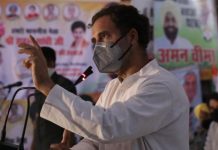 The world is experiencing a warlike situation. The pandemic, Covid-19, appears to be a never-ending trauma. A century ago, the world had faced the First World War (1914-19), fought in different war theatres on an unprecedented scale. It was a fight for supremacy, both strategic and economic, among the two leading European powers, Germany and Britain. During 1939-45, the world had barely survived the World War-II, the main players were the same with a variation in their respective alliances, but it ended with the use of two thermo-nuclear weapons. The issue remains the same i.e. strategic controls to optimize economic profits. The history appears to be repeating with an “undeclared war” engulfing the mankind. It has begun with a reported leak of Corona Virus from a Chinese facility in November 2019. It unleashes trails of deaths across continents without any effective treatment while mankind prepares to welcome the dawn of 2021.
The world is experiencing a warlike situation. The pandemic, Covid-19, appears to be a never-ending trauma. A century ago, the world had faced the First World War (1914-19), fought in different war theatres on an unprecedented scale. It was a fight for supremacy, both strategic and economic, among the two leading European powers, Germany and Britain. During 1939-45, the world had barely survived the World War-II, the main players were the same with a variation in their respective alliances, but it ended with the use of two thermo-nuclear weapons. The issue remains the same i.e. strategic controls to optimize economic profits. The history appears to be repeating with an “undeclared war” engulfing the mankind. It has begun with a reported leak of Corona Virus from a Chinese facility in November 2019. It unleashes trails of deaths across continents without any effective treatment while mankind prepares to welcome the dawn of 2021.
The suspicious role of China in tackling this “leak” has caused worldwide apprehensions. Its consistent refusal to allow international probe has caused doubts about its much-trumpeted innocence and the role of its laboratory at Wuhan. It has also forced the World Health Organization (WHO), to take a “careless attitude” in issuing directives. The organization is under the effective control of China for the past 14 years. The present WHO director-general, Dr Tedros Adhanom Ghebreyesus, Ethiopia’s public health minister, who could become the new head with the Chinese support in 2017.The WHO has been under the Chinese spell since 2006, when Dr Margaret Chan, director health in Hong Kong became its director-general. She had retained the position in 2012 too.
Meanwhile, China has adopted belligerent aggressive postures across the continents from the South China Sea to the Galwan Valley on the India- Tibet border in the high Himalayas. Its proxies openly supported Black movements in Europe and the USA, which could tear off their respective social fabric. Amidst these worldwide developments, the Chinese belligerence towards the world opinion was compounded by its confrontational attitude almost everywhere.
The Chinese yearning for a superpower status is now well- known, but its tactics and war games are different than those of the European powers. Its assertive politics reaffirms the suspicion that it may be a part of the biological war.
Shift in Geo-politics
The global conflicts of the previous century were fought openly, but during the last quarter of the 20th century, the world witnessed the existence of non-state players in the name of Jihadis or violent left movements. Since India is a front-line state and a target of these forces, she is not shocked by this “undeclared war”. She has already experienced the insurgency in her north-eastern region and Jihadis in Jammu and Kashmir. However, for the western powers, which had allowed unrestricted to China in their respective democratic institutions, they found themselves unable to cope up with this “aggression” overwhelming them with the spread of a manmade virus.
Earlier, the global scale wars were fought among the European nations. It is for the first time in the last five centuries, the European hegemony is being challenged that too by an Asian power, China, known as a nation of opium addicts just a century ago. This paradigm change could be possible because for the first time China has not only state-of-the-art technologies, it has penetrated into the institutions of the west known as the symbol of free democracy and play of capital. They included universities, science laboratories, newspapers, real estate and even the British nuclear power stations! All this was exposed with a pandemic that too during the presidential election in America.
The initial response of the major world powers during 2020 resembled like the British, French and Russian efforts to buy peace with Germany during the World Wars. The Chinese belligerence peaked with the end of the autonomy of Hong Kong and the confrontation with India in the Himalayas. The aggressive role of its proxies, which included its organizations promoting the left ideologies in the USA, was noticed, when the movement that the Black Life Matters (BLM) received the Chinese support.
It must be admitted that the American establishment’s response to this “well-planned” aggression was more of knee-jerk reactions. It lacked any well-conceived or planned strategy to tackle Chinese ambitions. Amidst the heightened tensions in the South China Sea and on the Indo-Tibetan border, it blatantly violated its solemn commitment to allow democratic institutions in Hong Kong. It was during the period of Deng’s regime, China had promised to retain the concept of one nation and two systems in Hong Kong i.e. it would retain democratic systems and independent media for next 50 years. This solemn assurance was given, when its sovereignty was transferred to China on July one, 1997. The present incumbent, Li Jinping, has dumped these assurances ignoring the world’s opinion. The reaction of the outgoing US-president, Donald Trump, resembled that of a caged tiger fuming and growling but is helpless. The British Prime Minister, Boris Johnson, too was silenced when China reminded him of the Chinese control on its nuclear power stations.
Amidst these developments, Li Jinping decides to give a huge credit line of 400 billion each to Iran and Russia for assured petroleum products for the next 25 years. He just ignores Trump’s decision to clamp economic blockade of Iran and compensates Russia, which was suffering economic down-trend due to the dwindling supply of its gas and petroleum products to European countries.
Jinping’s aggressive policy was further betrayed, when he refused to greet the president-elect, Joe Biden, till final results are tallied. It only reveals the assertive tone China had adopted in 2020, which might continue in the New Year too.
The Indian initiative
It is natural for people to ask what is in store for India in 2021. The belligerence of China may lead to a massive conflict between the two Asian neighbours. It is difficult to predict Russia, which is under the financial obligations of China, whether its Good Samaritan role to avoid war will succeed. Meanwhile, China is quietly getting its armed forces to excel in winter warfare by getting its soldiers trained in Canada. A full contingent has return to be deployed in the Ladakh-Tibet border. Meanwhile, Li Jinping has also elevated a new team of generals to be deployed on the sensitive border.
In spite of the Indian reluctance, China has succeeded in getting much-awaited trade agreement, Regional Comprehensive Economic Partnership (RCEP), signed by 15 nations of the region. The 15 Asian states, signatories to this agreement, include close Chinese partners like Cambodia as well as Japan and Australia, who have recently suffered Chinese aggressive policies in the region.
In the coming months, the world may witness more assertiveness from China. While the world economy is under crisis, China has reportedly been growing at a phenomenal rate of 21 per cent. The world may remain on the edge unless the top Chinese leadership overrules its president Li Jinping’s Machiavelli politics blended with its tradition war games.
letters@tehelka.com













